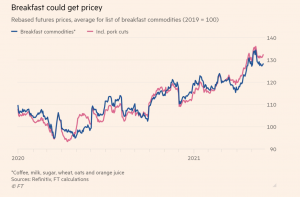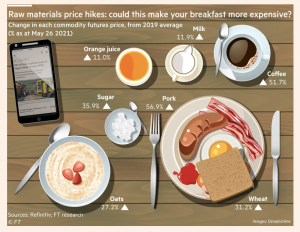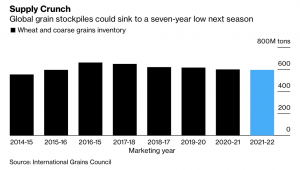Congress has quickly engaged in putting together potential aid packages for farmers that would more than double the Trump administration's $12 billion under the Farmer Bridge Assistance (FBA) Program.
Surging Costs of Breakfast Staples Stirs Food Price Concerns, as the U.S. and China Talk Trade
Financial Times writers Chelsea Bruce-Lockhart and Emiko Terazono reported this week that, “The cost of raw materials that go into making breakfast staples have roared higher since the pandemic began — raising fears that a broad commodity boom could push up global food prices for consumers.
Prices for bulk contracts of coffee, milk, sugar, wheat, oats and orange juice have jumped 28 per cent on average from 2019 levels, according to trading on US futures markets, where companies lock in supplies or hedge their exposure to commodities costs. For meat-eaters, adding pork to that list pushes the average price rise to 32 per cent.
“The cost of raw ingredients accounts for only part of the overall price paid for products at the supermarket or in restaurants, but substantial cost rises were likely to be passed on to consumers, said analysts.”

The FT article noted: “‘Food inflation is real in many places. It’s not going away soon,’ said Abdolreza Abbassian, senior economist at the UN Food and Agriculture Organization. In April, the FAO’s real food price index — which tracks a wide range of products — hit its highest level in a decade.”

“Wheat prices are up by 16 per cent since the start of last year, while corn has surged by more than 60 per cent. Corn has been driven higher by Chinese buying, which is in turn is fuelling higher prices for alternative grains, including wheat.”
And Reuters writers Tom Polansek, Ana Mano, and Agustin Geist reported this week that, “Beef prices are surging worldwide, taking meat off the menu in steak-loving Buenos Aires and spoiling summer barbecues in the United States as Chinese imports rise and the cost of feeding cattle soars.
“Globally, the surge is contributing to the highest food prices since 2014, according to the United Nations food agency, hitting poorer consumers particularly hard as they struggle to recover from economic shutdowns triggered by the COVID-19 pandemic.”
The Reuters article noted that, “U.S. beef exports to China hit a monthly record in March of 14,552 tonnes, according to the U.S. Department of Agriculture, well above total shipments in all of 2019. A growing middle class in China is making room for beef in a diet that has long been pork-based.”
Also this week, Bloomberg writer Megan Durisin reported that,
Global grain stockpiles could grow even slimmer next season, exacerbating a supply crunch across crop markets already pushing up food prices.
“The International Grains Council cut its inventory estimate for the 2021-22 season to 595 million tons, the lowest in seven years, according to a report published Thursday. Rising animal-feed demand and a drought-stricken Brazilian corn crop are outweighing bumper harvests elsewhere, shrinking the world’s grain supply cushion for a fifth straight season.”

Meanwhile, Bloomberg News reported this week that, “U.S. Trade Representative Katherine Tai and China’s Vice Premier Liu He had a ‘candid’ first conversation as the two sides try to resolve some of their differences on trade.
“The trade chiefs spoke Thursday morning in Beijing, China’s Ministry of Commerce said in a statement, and ‘conducted candid, pragmatic and constructive exchanges in an attitude of equality and mutual respect.’
“In a separate statement, the USTR said ‘Ambassador Tai discussed the guiding principles of the Biden-Harris administration’s worker-centered trade policy and her ongoing review of the U.S.-China trade relationship, while also raising issues of concern.'”
And Reuters writers Xu Jing, Stella Qiu and Ryan Woo reported this week that, “China and the United States should work together to push for the implementation of Phase 1 trade deal, commerce ministry spokesman Gao Feng told a news conference on Thursday.
“Gao’s comments followed the first virtual call between China’s Vice Premier Liu He and U.S. Trade Representative Katherine Tai.”





